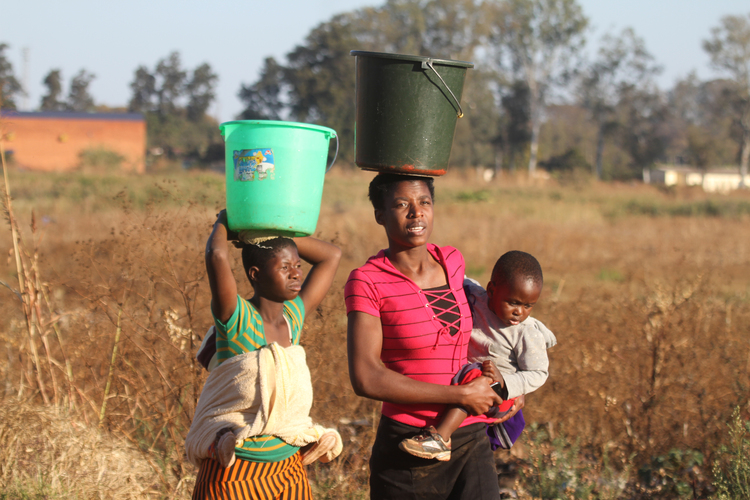
The Sunday Mail

Settlements like Hopley and Caledonia farms did not exist. Boreholes were few and far between, and PVC water storage tanks were a rare sight.
Cities grow, and the challenges of urbanisation set in. Harare has been no exception.
The population had swelled to over 2,5 million by 2012, several new suburbs sprouted and the demands of residential and commercial water use took their toll.
However, despite all these changes, water management appears to have remained stuck in the days when less than half the present population resided in Zimbabwe’s capital city.
In fact, rather than improving, water supply has declined by about 50 percent in real terms as the city is managing only 400 mega-litres of water a day against demand of 1 000 mega-litres.
Research shows that enough has not been done to raise capacity at water plants such as Morton Jaffray, Prince Edward, Firle, Crowborough and the now redundant Odis.
The situation has left swathes of Harare without consistent running water for years, with residents of Borrowdale, and parts of Ruwa, Mabvuku and Chitungwiza Town being most affected.
This is despite the fact that several countries, among them China and Germany, have come with financial and technical assistance in the form of grants, loans and other arrangements towards either rehabilitation of Harare’s plants or building of more water reservoirs.
Financial assistance in the past ten years includes a US$10 million grant from Government; African Development Bank loans; as well as a US$144 million loan from Eximbank of China last year in addition to World Bank-backed initiatives.
A proposed US$3 billion loan facility between the City of Harare and Singaporean company Neoparagon for construction of three dams adds to the list.
The Government grant resulted in improvements in access to water treatment chemicals, while the ongoing World Bank facility has spruced up infrastructure.
However, questions remain about the US$144 million China Eximbank facility, which analysts say Harare badly negotiated and could be misusing.
Harare Mayor Bernard Manyenyeni recently said water supply was deteriorating due to misuse of funds.
“I am aware of people in Borrowdale who have not had water for years. I am also aware of people in Mabvuku and Tafara who had not had water for years,” he said. “Yet, some of the latest monies, which had been earmarked for work on the water and reticulation system, in particular the US$144 million has been used to buy vehicles for management.
“At or about the same time vehicles were being bought, our water supply reduced by 20 percent from 500 mega-litres a day to 400 mega-litres a day.”
Water expert Engineer Petros Chidzero says the US$3 billion plan proposed deal could be a Godsend if properly managed.
“It’s easy for one to suspect foul play especially when you have a national budget of US$4 billion and someone comes in saying he wants to invest US$3 billion for development of water projects alone,” he said. “But we must not forget that this is a 30-year deal and from what I have learnt the money will be released in parts. The money may be a lot but with a growing population … it is good that we have long-term planning.” Harare Residents Trust director Mr Precious Shumba takes a dimmer view. “What is happening is that these deals are being announced as a way to impress citizens and other stakeholders that something worthwhile is being done to address the water problems when in essence these deals have become the tools of self-enrichment for city officials at Town House.”
Mr Shumba said the ultimate solution to Harare’s water problems lay in accountable and transparent management at Town House.
Experts also say there is need for independent verification of the impact previous such deals.
Council minutes indicate that most councillors are of the view that an independent Harare Water board be put in place before finalisation of the Singapore deal. Experts say as much as 50 percent of treated water is lost through leakages along the distribution network, and another 30 percent through illegal water connections.
However, city officials say all water projects are going according to plan and people should not expect too much too soon by way of results. Harare Water director Eng Christopher Zvobgo told the Environmental Management Committee that residents will begin to enjoy benefits of the US$144 million project in December 2014.
“Satisfactory progress has been made since April 2013. The contractor has completed facility and equipment designs, specifications and drawings and over 90 percent of this work has been done,” he said.
The city council could however not immediately breakdown the amount spent on the project so far. The project is scheduled for completion by April 2016.
Harare also says it is being prevented from providing quality service as it is owed a lot of money by clients.
![[Picture by Kudakwashe Hunda]](http://www.sundaymail.co.zw////wp-content/uploads/2014/08/1508-1-1-WATER-SHORTAGE-1.jpg)



